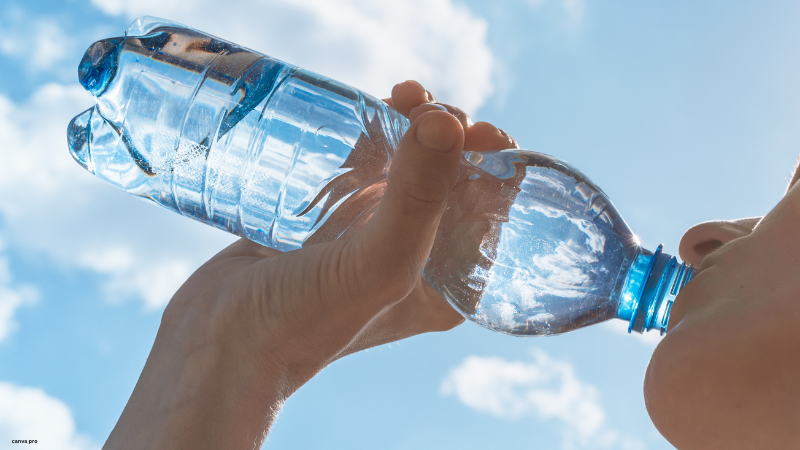Discover how you can play a crucial role in staying optimally hydrated with personalized strategies, hydration tracking, and incorporating the right fluids and foods to beat the summer heat
As temperatures soar and heat waves grip regions worldwide, the importance of hydration becomes a vital concern not just for our planet’s health but also for our own well-being. Dehydration, a condition with serious consequences, from diminished cognitive performance to increased risk of chronic disease, is a risk we cannot afford to ignore. Yet, navigating the complexities of proper hydration amidst scorching conditions can be a challenge.
In this comprehensive guide, we’ll delve into the nuances of hydration needs, exploring evidence-based strategies to ensure you’re drinking the right amount of water—and the right types of fluids—to beat the heat and safeguard your health. From monitoring bathroom breaks to incorporating hydrating foods, we’ll equip you with the knowledge to make informed choices and stay refreshed, even on the hottest of days.
Understanding Your Baseline Hydration Needs
Determining your optimal daily fluid intake is not a one-size-fits-all proposition. The amount of fluid your body requires can vary significantly based on factors such as age, gender, activity level, and even your geographic location. As a general rule of thumb, the recommended water intake for most healthy adults is between 68 and 100 ounces per day.
However, this baseline can shift dramatically when the mercury rises, and the heat index climbs. “In the heat, everyone needs more water,” cautions Dr. Ashley Karpinos, associate professor of medicine, pediatrics, and sports medicine at Vanderbilt University Medical Center. For those physically active or spending extended time outdoors, the recommended intake can climb to a staggering 8 ounces of water every 15 to 20 minutes to maintain proper sodium balance and body temperature regulation.

Mastering the Art of Hydration Tracking
Staying on top of your hydration levels is crucial, but counting ounces consumed may not tell the whole story. “It’s not [about] how much you’re drinking, it’s what your urine output is,” explains Dr. Seth Feltheimer, a primary care physician and associate professor of medicine at Columbia University.
The key lies in monitoring your bathroom habits. If you’re not urinating at least every two to three hours, you’re likely not drinking enough. Conversely, urine color and volume can also provide valuable insights. Pale, copious urine is a telltale sign of proper hydration, while dark yellow or infrequent urination may indicate dehydration, which can lead to issues like constipation and impaired kidney function.
Hydrating Beyond Plain Water
While water remains the gold standard for hydration and does effectively hydrate you, it’s not the only fluid that can keep you refreshed on scorching days. Beverages rich in electrolytes, such as sports drinks and coconut water, can be particularly beneficial after prolonged exposure to heat or physical exertion.
Surprisingly, even milk—both skim and full-fat varieties—can be a hydrating option, potentially making it one of the best foods for hydration. A 2016 study published in the American Journal of Clinical Nutrition found that milk had a similar hydrating effect as water, potentially due to its sodium and electrolyte content.
Avoiding Dehydrating Culprits
Not all liquids are created equal when it comes to hydration. Caffeinated drinks and alcoholic beverages, such as coffee, tea, and alcoholic cocktails, can have a diuretic effect, causing the body to lose more fluids than it takes in.
“Anything over four cups of coffee, and it starts to become a diuretic,” warns Dr. Dana Cohen, an integrative medicine practitioner and co-author of the book “Quench.” This raises the question of whether coffee is hydrating or counts as water intake. The same principle applies to tea, leading some to wonder whether tea dehydrates you or counts as water intake. While moderate amounts may not significantly impact, excessive consumption of these beverages can contribute to dehydration. Alcohol can also impair the body’s ability to regulate its temperature, further exacerbating the risks of dehydration.
Incorporating Hydrating Foods
How to stay hydrated doesn’t have to be limited to drinking fluids. Incorporating water-rich foods into your diet can be a delicious and effective way to boost your overall hydration levels.
Dr. Karpinos recommends foods that hydrate you, including fruits and vegetables like watermelon, cantaloupe, berries, peppers, lettuce, and cucumbers, which are excellent sources of hydration due to their high water content. Smoothies, chia seeds, and flax seeds can also be valuable additions, as they help the body retain water more effectively, offering insight into how to stay hydrated without drinking water.
Hydrating Before It’s Too Late
One of the most common mistakes people make is waiting until they feel thirsty to start drinking. By the time thirst sets in, dehydration has already begun to take hold. To stay one step ahead, it’s crucial to hydrate proactively before and during heat exposure or physical activity.
“Drink water before bed and first thing in the morning,” advises Lina Begdache, a registered dietitian and associate professor at Binghamton University’s Decker College of Nursing and Health Sciences. This can help replenish the fluids lost during sleep through respiration and sweating.
Safeguarding the Vulnerable
Certain populations are particularly susceptible to the dangers of dehydration, requiring extra vigilance and care. Children, for instance, have smaller water reserves and are more prone to dehydration in hot weather. Toddlers may need as little as 32 ounces daily, while pre-teens should aim for around 60 ounces.
The elderly also face heightened risks, as the body’s water content naturally decreases with age. A 2023 study published in the International Journal of Clinical and Laboratory Medicine found that 31% of elderly participants were dehydrated, with an increased prevalence of conditions like diabetes and chronic kidney disease.
Hydration Strategies for Athletes
Proper hydration becomes even more critical for maintaining optimal athletic performance for those engaged in physical activity. Athletes must carefully plan their fluid intake before, during, and after exercise sessions.
“The goal is to start an exercise session well-hydrated, maintain hydration during exercise, and then correct excessive losses afterward,” explains Dr. Karpinos, who serves as the team physician for Vanderbilt University athletics. This typically translates to an additional 12 ounces of water two hours before exercise and 8 ounces every 15-20 minutes during the workout to replace fluids lost through sweat and maintain a stable heart rate.
Recognizing the Signs of Dehydration
Staying vigilant for the early warning signs of dehydration can make all the difference in preventing its more severe consequences. Telltale indicators include thirst, dry mouth and lips, decreased sweating, and dark-colored urine.
More advanced symptoms, such as body cramps, lethargy, and an inability to urinate, signal that the body is desperately trying to conserve whatever fluid it has left. Research shows that even a 2% drop in hydration can lead to cognitive impairment, headaches, and dizziness, underscoring the importance of hydration and its vitality.
The Perils of Overhydration
While the dangers of dehydration are well-documented, it’s also essential to be mindful of the risks of overhydration. Drinking too much water, often in an attempt to stay hydrated during hot weather, can you drink too much water and lead to a dangerous condition called hyponatremia – a state of low sodium levels in the blood.
Dr. Cohen says she regularly sees patients with lab results indicating dangerously low sodium and chloride levels due to excessive water intake. Overhydration can trigger many of the same symptoms as dehydration, including muscle cramps and fatigue, underscoring the importance of striking the right balance and knowing how much water you should drink a day.
Prioritizing Long-Term Hydration
Proper hydration is not just a short-term concern – its implications extend far beyond the immediate effects of heat exposure. A 2023 study published in The Lancet found that chronic dehydration can contribute to premature aging, the development of chronic diseases (including heart failure, diabetes, and dementia), and even premature death.
Source:
Jamie Friedlander Serrano (July 8, 2024). How Much Water Should You Drink When It’s Hot Outside?. Times. https://time.com/6996126/how-much-water-to-drink-heat-hot-outside/. Accessed July 12, 2024
Other posts you might like to read:
8 Resilient Houseplants for Low-Light Space
